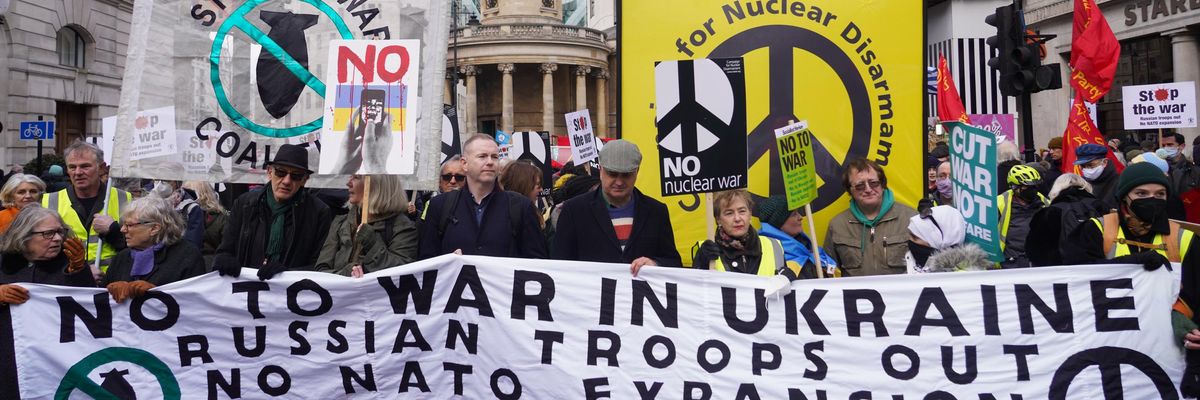

SUBSCRIBE TO OUR FREE NEWSLETTER
Daily news & progressive opinion—funded by the people, not the corporations—delivered straight to your inbox.
5
#000000
#FFFFFF
To donate by check, phone, or other method, see our More Ways to Give page.


Daily news & progressive opinion—funded by the people, not the corporations—delivered straight to your inbox.

Thousands of demonstrators march for peace in Ukraine on February 6, 2022 in central London. (Photo: Kristian Buus/In Pictures via Getty Images)
Amid Moscow's thermonuclear saber-rattling during Russia's invasion of Ukraine, state parties to the Treaty on the Prohibition of Nuclear Weapons on Thursday condemned "any and all nuclear threats" while calling on more countries to sign and ratify the landmark accord.
"This is the strongest condemnation of nuclear threats by a multilateral U.N. conference."
As the first Meeting of State Parties (1MSP) to the TPNW wrapped up in Vienna, the 65 countries that have signed and ratified the treaty issued a declaration and action plan unequivocally condemning threats to wage nuclear war, "whether they be explicit or implicit and irrespective of the circumstances."
The TPNW signatories committed to "further stigmatizing and delegitimizing nuclear weapons and steadily building a robust global peremptory norm against them."
"In the face of the catastrophic risks posed by nuclear weapons and in the interest of the very survival of humanity... we will not rest until the last state has joined the treaty, the last warhead has been dismantled and destroyed and nuclear weapons have been totally eliminated from the Earth," the declaration concludes.
\u201cThe declaration concludes with an unprecedented commitment to the prohibition and elimination of nuclear weapons. \u201cWe will not rest until the last state has joined this Treaty\u201d.\u201d— Beatrice Fihn (@Beatrice Fihn) 1655994933
Beatrice Fihn, executive director of the Nobel Peace Prize-winning International Campaign to Abolish Nuclear Weapons (ICAN), said in a statement that "this is the strongest condemnation of nuclear threats by a multilateral U.N. conference, and shows an unprecedented commitment by a global alliance of states, survivors of nuclear detonations, international organizations, and civil society to prevent nuclear war and eliminate nuclear weapons."
Masao Tomonaga, a survivor of the August 9, 1945 U.S. nuclear attack on Nagasaki, Japan that killed more than 75,000 people, said that "this political declaration is a very strong document, despite many difficulties we face."
"With this powerful document we can go forward, and all Hibakusha support this; it is a great document," Tomonaga added, referring to the Japanese word for atomic bomb survivor.
The declaration and action plan come after Russian President Vladimir Putin warned last week that his country could use nuclear weapons if its sovereignty is threatened.
With more than 11,000 nuclear warheads in their combined arsenals, Russia and the United States--the only nation to ever wage nuclear war--are the world's leading atomic powers.
Related Content

Eighty-six nations have signed the TPNW and 65 have ratified the accord. Notably, none of the world's nine nuclear powers--China, France, India, Israel, North Korea, Pakistan, Russia, the United Kingdom, and the United States--have signed the agreement.
Donald Trump’s attacks on democracy, justice, and a free press are escalating — putting everything we stand for at risk. We believe a better world is possible, but we can’t get there without your support. Common Dreams stands apart. We answer only to you — our readers, activists, and changemakers — not to billionaires or corporations. Our independence allows us to cover the vital stories that others won’t, spotlighting movements for peace, equality, and human rights. Right now, our work faces unprecedented challenges. Misinformation is spreading, journalists are under attack, and financial pressures are mounting. As a reader-supported, nonprofit newsroom, your support is crucial to keep this journalism alive. Whatever you can give — $10, $25, or $100 — helps us stay strong and responsive when the world needs us most. Together, we’ll continue to build the independent, courageous journalism our movement relies on. Thank you for being part of this community. |
Amid Moscow's thermonuclear saber-rattling during Russia's invasion of Ukraine, state parties to the Treaty on the Prohibition of Nuclear Weapons on Thursday condemned "any and all nuclear threats" while calling on more countries to sign and ratify the landmark accord.
"This is the strongest condemnation of nuclear threats by a multilateral U.N. conference."
As the first Meeting of State Parties (1MSP) to the TPNW wrapped up in Vienna, the 65 countries that have signed and ratified the treaty issued a declaration and action plan unequivocally condemning threats to wage nuclear war, "whether they be explicit or implicit and irrespective of the circumstances."
The TPNW signatories committed to "further stigmatizing and delegitimizing nuclear weapons and steadily building a robust global peremptory norm against them."
"In the face of the catastrophic risks posed by nuclear weapons and in the interest of the very survival of humanity... we will not rest until the last state has joined the treaty, the last warhead has been dismantled and destroyed and nuclear weapons have been totally eliminated from the Earth," the declaration concludes.
\u201cThe declaration concludes with an unprecedented commitment to the prohibition and elimination of nuclear weapons. \u201cWe will not rest until the last state has joined this Treaty\u201d.\u201d— Beatrice Fihn (@Beatrice Fihn) 1655994933
Beatrice Fihn, executive director of the Nobel Peace Prize-winning International Campaign to Abolish Nuclear Weapons (ICAN), said in a statement that "this is the strongest condemnation of nuclear threats by a multilateral U.N. conference, and shows an unprecedented commitment by a global alliance of states, survivors of nuclear detonations, international organizations, and civil society to prevent nuclear war and eliminate nuclear weapons."
Masao Tomonaga, a survivor of the August 9, 1945 U.S. nuclear attack on Nagasaki, Japan that killed more than 75,000 people, said that "this political declaration is a very strong document, despite many difficulties we face."
"With this powerful document we can go forward, and all Hibakusha support this; it is a great document," Tomonaga added, referring to the Japanese word for atomic bomb survivor.
The declaration and action plan come after Russian President Vladimir Putin warned last week that his country could use nuclear weapons if its sovereignty is threatened.
With more than 11,000 nuclear warheads in their combined arsenals, Russia and the United States--the only nation to ever wage nuclear war--are the world's leading atomic powers.
Related Content

Eighty-six nations have signed the TPNW and 65 have ratified the accord. Notably, none of the world's nine nuclear powers--China, France, India, Israel, North Korea, Pakistan, Russia, the United Kingdom, and the United States--have signed the agreement.
Amid Moscow's thermonuclear saber-rattling during Russia's invasion of Ukraine, state parties to the Treaty on the Prohibition of Nuclear Weapons on Thursday condemned "any and all nuclear threats" while calling on more countries to sign and ratify the landmark accord.
"This is the strongest condemnation of nuclear threats by a multilateral U.N. conference."
As the first Meeting of State Parties (1MSP) to the TPNW wrapped up in Vienna, the 65 countries that have signed and ratified the treaty issued a declaration and action plan unequivocally condemning threats to wage nuclear war, "whether they be explicit or implicit and irrespective of the circumstances."
The TPNW signatories committed to "further stigmatizing and delegitimizing nuclear weapons and steadily building a robust global peremptory norm against them."
"In the face of the catastrophic risks posed by nuclear weapons and in the interest of the very survival of humanity... we will not rest until the last state has joined the treaty, the last warhead has been dismantled and destroyed and nuclear weapons have been totally eliminated from the Earth," the declaration concludes.
\u201cThe declaration concludes with an unprecedented commitment to the prohibition and elimination of nuclear weapons. \u201cWe will not rest until the last state has joined this Treaty\u201d.\u201d— Beatrice Fihn (@Beatrice Fihn) 1655994933
Beatrice Fihn, executive director of the Nobel Peace Prize-winning International Campaign to Abolish Nuclear Weapons (ICAN), said in a statement that "this is the strongest condemnation of nuclear threats by a multilateral U.N. conference, and shows an unprecedented commitment by a global alliance of states, survivors of nuclear detonations, international organizations, and civil society to prevent nuclear war and eliminate nuclear weapons."
Masao Tomonaga, a survivor of the August 9, 1945 U.S. nuclear attack on Nagasaki, Japan that killed more than 75,000 people, said that "this political declaration is a very strong document, despite many difficulties we face."
"With this powerful document we can go forward, and all Hibakusha support this; it is a great document," Tomonaga added, referring to the Japanese word for atomic bomb survivor.
The declaration and action plan come after Russian President Vladimir Putin warned last week that his country could use nuclear weapons if its sovereignty is threatened.
With more than 11,000 nuclear warheads in their combined arsenals, Russia and the United States--the only nation to ever wage nuclear war--are the world's leading atomic powers.
Related Content

Eighty-six nations have signed the TPNW and 65 have ratified the accord. Notably, none of the world's nine nuclear powers--China, France, India, Israel, North Korea, Pakistan, Russia, the United Kingdom, and the United States--have signed the agreement.